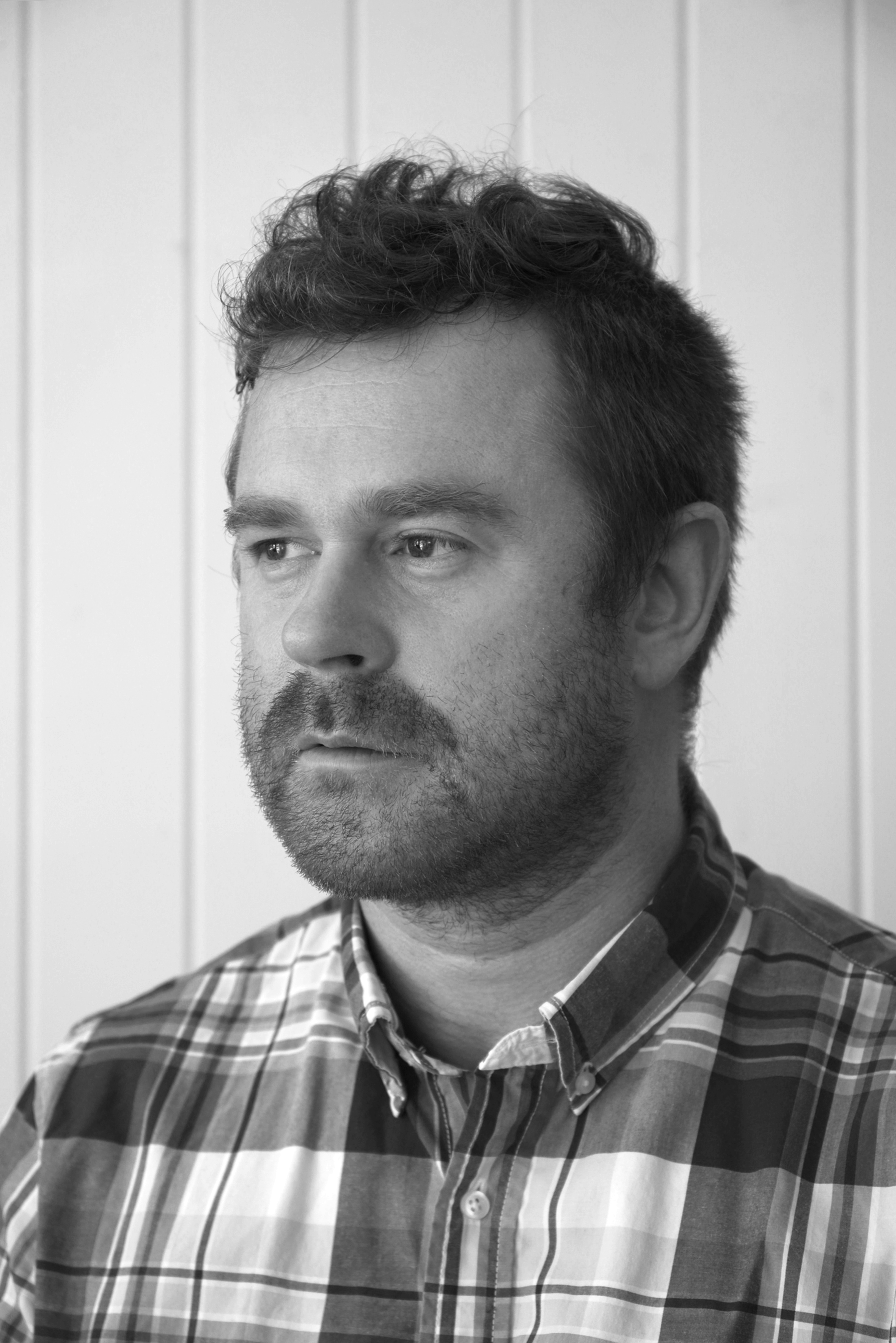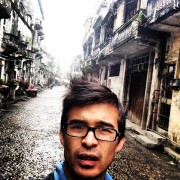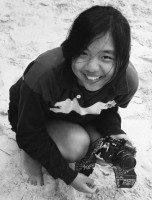 Stuart Barnes is a Tasmanian-born, Queensland-based poet and the poetry editor of Tincture Journal and Verity La. In 2014 he was named Runner-up in the Arts Queensland Thomas Shapcott Poetry Prize and co-judged the ACT Publishing Awards’ poetry category. An anthology of poetry, with Robbie Coburn, Nathan Hondros, Rose Hunter, Carly-Jay Metcalfe and Michele Seminara, is forthcoming from Regime Books. Twitter @StuartABarnes
Stuart Barnes is a Tasmanian-born, Queensland-based poet and the poetry editor of Tincture Journal and Verity La. In 2014 he was named Runner-up in the Arts Queensland Thomas Shapcott Poetry Prize and co-judged the ACT Publishing Awards’ poetry category. An anthology of poetry, with Robbie Coburn, Nathan Hondros, Rose Hunter, Carly-Jay Metcalfe and Michele Seminara, is forthcoming from Regime Books. Twitter @StuartABarnes
MH: Who is the poet who has most inspired you, and why?
SB: At my 30th birthday party a friend gave me a Brunswick Street Bookstore voucher, which I redeemed for Sylvia Plath’s Collected Poems (and Mervyn Peake’s The Gormenghast Trilogy, which inspired Faith, one of my favourite records by The Cure). Collected helped me navigate a particularly intense depression. In Words in Air: The Complete Correspondence between Elizabeth Bishop and Robert Lowell, Lowell writes: “[Plath] almost makes one feel at first reading that almost all other poetry is about nothing. … [Although] I can scarcely bear to read her poems through, they are so agonized. A bit formless for my taste, too”. Interesting observations. The former I agree with; the latter rubs me the wrong way. I find Plath’s poetry and prose—Johnny Panic, Unabridged Journals, Letters Home—transformative, distinct, composed; thick with wit, drive, love, hope and well crafted last lines. These aspects continue to inspire; her life’s minutiae only insofar as they influenced her writing.
MH: What is poetry for?
SB: Pleasure. Pain relief. Enlightenment. Escape. Absolution. Past, present, future.
MH: Could you tell us a little about being an online editor? What are the pains and joys of this?
SB: I love editing poetry for Tincture Journal and Verity La, but the online environment is a double-edged sword: 24/7-accessible, yet an energy leech. More and more I dream about living off the grid, but I don’t want to relinquish what I do. To be able to read and edit others’ poetry is a privilege and a great collaboration. I often think I’m more enriched by the experience than the contributors. One of the joys, which outnumber the pains, is accepting that first work by an exceptional new writer: an unearthing of buried treasure. One of the pains is sifting incorrectly sent material; guidelines are so easy to follow.
MH: If you could live anywhere else in the world where would it be? Why so?
SB: Ancient Egypt or British East Africa. Dreams, visions, past life experiences.
MH: Could you list ten of your favourite poetry collections please…?
SB: Alphabetised: Ashes in the Air, Ali Alizadeh; Free Logic, Rachael Briggs; When My Brother Was an Aztec, Natalie Diaz; The Three Fates & Other Poems, Rosemary Dobson; Bone Scan, Gwen Harwood; The Striped World, Emma Jones; The Earth in the Attic, Fady Joudah; Ariel: The Restored Edition, Sylvia Plath; The Brink, Jacob Polley; Akhenaten, Dorothy Porter.
MH: What is your relationship to music?
SB: I was raised in a home where there was always the right LP for the right occasion. Before I could speak I could hum Dolly, Johnny, The Beatles. From an early age I’d set my alarm for 11 p.m. every Friday and Saturday, watch rage till just before my parents woke. I loved, equally, the new music, the guest programmers, the Top 50 Countdown. Besides befriending Gwen Harwood, hymns were the only thing I liked about church. At ten, with my own pocket money, I bought my first record: Bananarama’s WOW! An obsession with everything Stock Aitken Waterman followed. At fifteen I was introduced to The Cure, discovered a number of almost-as-brilliant UK bands: Curve, Ride, Dead Can Dance, Swervedriver, Cocteau Twins, Stone Roses, My Bloody Valentine, Siouxsie and the Banshees, The Jesus and Mary Chain. From America: Primus, Fugazi, Red Hot Chili Peppers. In those days triple j was a spring of astonishing alternative music; I digged, just as much, Hobart’s local mainstream stations. When I moved to Melbourne at eighteen I met a girl obsessed with Britpop and electronica. Each week, music drew us to Q&A, Smashing, Teriyaki Anarki Saki. Blur, Pulp and Suede I still listen to; FSOL, Sasha and Digweed and Laurent Garnier, too. At the turn of the second millennium, Warp Records, Philip Glass, Henryk Górecki. Gay, underground and day clubs, raves and dance parties offered up a honking skein of artists. For a number of years I played violin, guitar, piano; for several I wrote songs and sang “as badly as Robert Smith”, according to my family (I always wanted to be a writer, but I always wanted to be a rock star more: too shy; and I never could perfect that union of lyrics and melody). For a couple in the mid-noughties I DJ’ed at three Melbourne pubs. Eventually I stopped going to bars, clubs, gigs, stopped smoking, drinking and whatnot. “Our relationship will suffer!” I needn’t have worried. I became more resourceful (podcasts, SoundCloud, Shazam). Nowadays, I put on music less often, though with no less affection; I’ve learnt to enjoy the silence. Occasionally I miss the dance floor’s sweat ‘n’ bump, its tribal triumph. All music and all lyrics, particularly The Cure’s and Robert Smith’s, have influenced the big things, writing especially. Music has been pacifier and blue security blanket. Catalyst of Dionysian Mystery and screaming at the moon. Music is white flag, time machine, memory aid, stimulant, narcotic. Saint Etienne’s “I couldn’t go to Somerset on my own, so I used Top of the Pops as my World Atlas”. Magic moments (Underworld’s ‘Born Slippy’ at Wall Street at midnight on New Year’s Eve; The Orb’s extended live version of ‘Little Fluffy Clouds’ at Earthcore at dawn; Diamanda Galás’ version of The Supremes’ ‘My World Is Empty Without You’ at twilight at Hamer Hall). Music is my North, my South, my East and West. The perfect—the only—drug, best served without preconception. Causes me to dance and sing, get up and do my thing. I am as happy cranking Zappa as I am miming ABBA. Spice Girls are as vital as Billy Bragg. Not every day, but I wake, write, edit, eat, shower, daydream and fall asleep to music.
MH: You are a big writer of centos. What attracts you to them?
SB: For years I’ve marvelled at the art of mixing vinyl, which I never mastered in the DJ days. I’ve never solved a cryptic crossword; the cento, I think, is poetry’s cryptic crossword. The challenge is highly attractive; I like rules, e.g., ‘Forcento’ (Rabbit Poetry Journal #10) lifted one line from six poems about gravity, ‘Penultimates’ (Regime 05) the second-to-last line from each of Ariel: The Restored Edition’s forty poems, ‘Cinquecento’ http://cordite.org.au/poetry/notheme3/cinquecento/ one line from fifteen poems written in the sixteenth century. Also (and this realisation occurred while talking with friend and fellow writer Nigel Featherstone last year), writing a cento is my way of critically engaging with other texts without reviewing them (I enjoy reviewing, but I’m slow at writing prose).
MH: Once upon a time poetry was quite popular. If in fact it still is, what can we do to make it even more popular, without sacrificing any of its difficulties?
SB: Sacrifice its poet-difficulties: the cynics, the trolls, the ogres.
MH: Why is the word ‘poet’ slightly amusing?
SB: “I’m a poet” is almost defiant; I have to find strangers’ and acquaintances’ insensitive responses slightly amusing: “I didn’t think they still existed! Where’s your inkwell, where’s your quill, where’s your powdered wig? Your favourite poet’s Plath, eh; you love all that doom and gloom? Does poetry pay the bills? When are you going to grow up? When are you going to get a real job?” And my favourite, which Ivor Indyk mentioned in Sydney Review of Books http://www.sydneyreviewofbooks.com/20-march-2015-ivor-indyk-on-novelists-and-poets/: “Poets just sit around for months on end, waiting for inspiration”.
MH: How does living in Central Queensland affect your writing?
SB: In my editorial for Tincture Journal Issue Nine http://tincture-journal.com/buy-a-tincture/ I wrote about the astrological implications of living so close to the Tropic of Capricorn. The proximity of rainforest and the sea and clearly seeing the Milky Way have expanded my awareness of, my sensitivity to nature’s rhythms. Rockhampton receives over three hundred days of sunshine a year, a stark contrast to Melbourne, so I’m a happier chappie, a happier writer. Moving from Victoria utterly befuddled me. When I settled, however, the past’s horrors were uncorked and in poured new influences. I started taking yoga and meditation seriously; now, I practice every day. I kind of haunted Clifton Hill from a tiny three-storey two bedroom flat; here I’ve an enormous three bedroom Queenslander with a tyre swing, mangoes, coconut palms … Recently, my first tropical cyclone; in Marcia’s aftermath, as I gape at the poincianas and the gums, I’m reminded of lines from The Cure’s ‘Shake Dog Shake’ (“I’ll tear your red hair by the roots”) and Plath’s ‘The Hanging Man’ (“By the roots of my hair some god got hold of me”). This city’s very different, still very much an inspiration.
MH: Are there any areas you feel poetry should not venture into?
SB: No.
MH: When are you going to put a book out?
SB: A publication, with fellow poets Robbie Coburn, Nathan Hondros, Rose Hunter, Carly-Jay Metcalfe and Michele Seminara, is forthcoming from Regime Books.
~~~
MATT HETHERINGTON is a writer, music-maker, gourmet Indian chef, soccer nut, bludger, and lover based in Brisbane. His first collection of all-Japanese-related forms (and fourth poetry collection) is For Instance, published by Mulla Mulla Press. Some current inspirations are: Timbaland, Frisky Dingo, Jess, Luce, and northern sunshine. Matt’s latest published poetry can be found in a three-way collaboration with poets Ryan Van Winkle and David Stavanger here: http://ryanvanwinkle.com/projects/commiserate-2015/
 Marjon is a secondary school teacher of English/Literature residing in Melbourne, Victoria. Her poetry has been published in Australian Poetry Journal, Antipodes, Southerly, The Moth Magazine, Island, Gargouille, Blue Dog, and Going Down Swinging, and am forthcoming in Contrappasso magazine and The Australian.
Marjon is a secondary school teacher of English/Literature residing in Melbourne, Victoria. Her poetry has been published in Australian Poetry Journal, Antipodes, Southerly, The Moth Magazine, Island, Gargouille, Blue Dog, and Going Down Swinging, and am forthcoming in Contrappasso magazine and The Australian.







